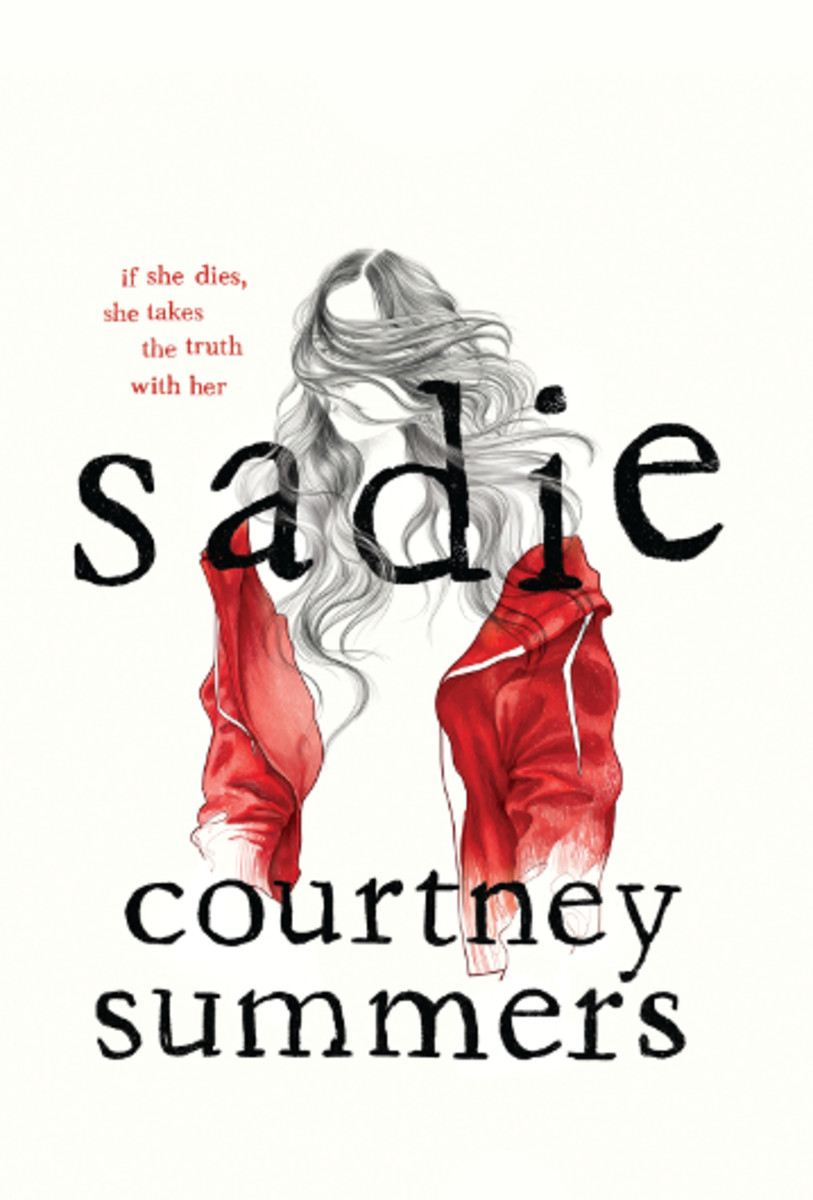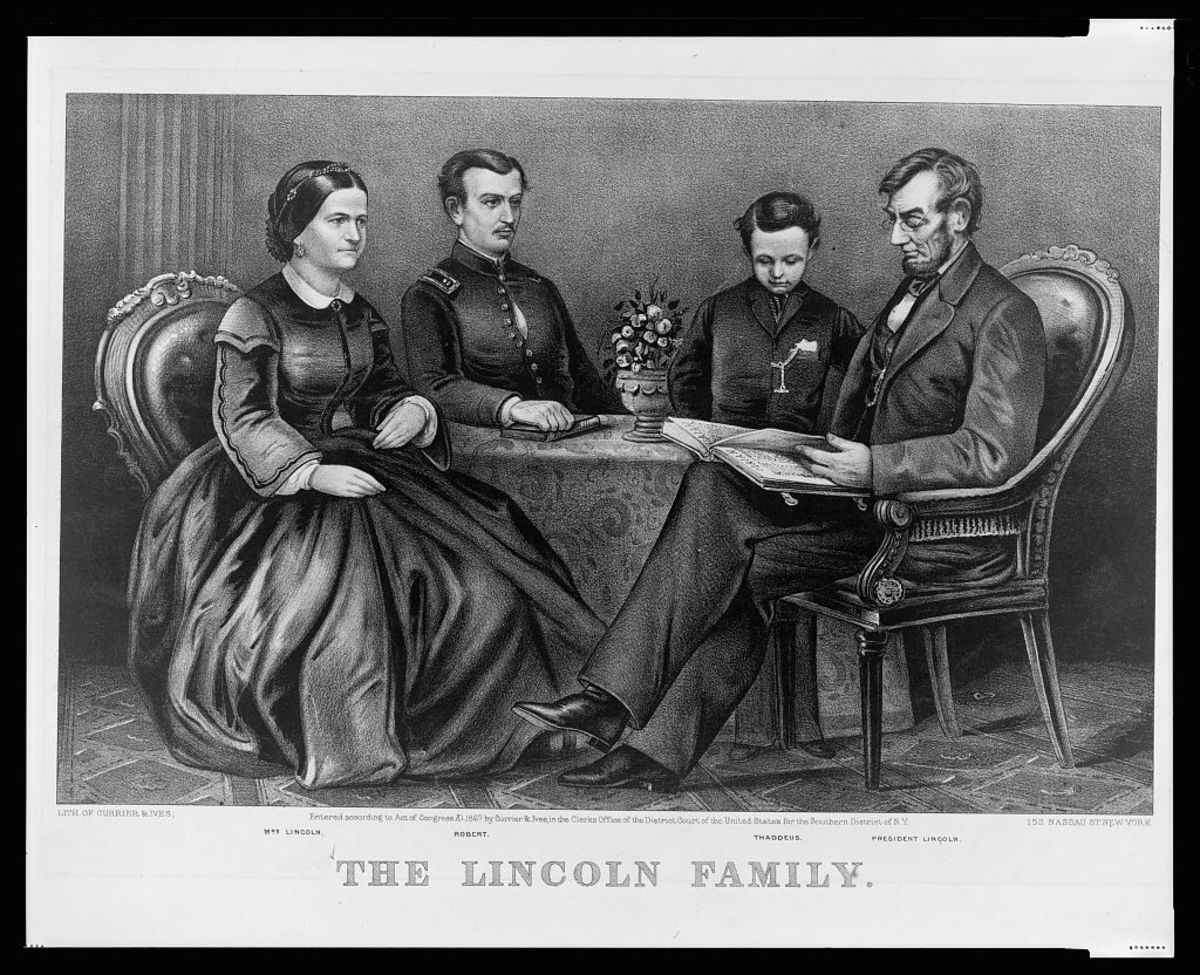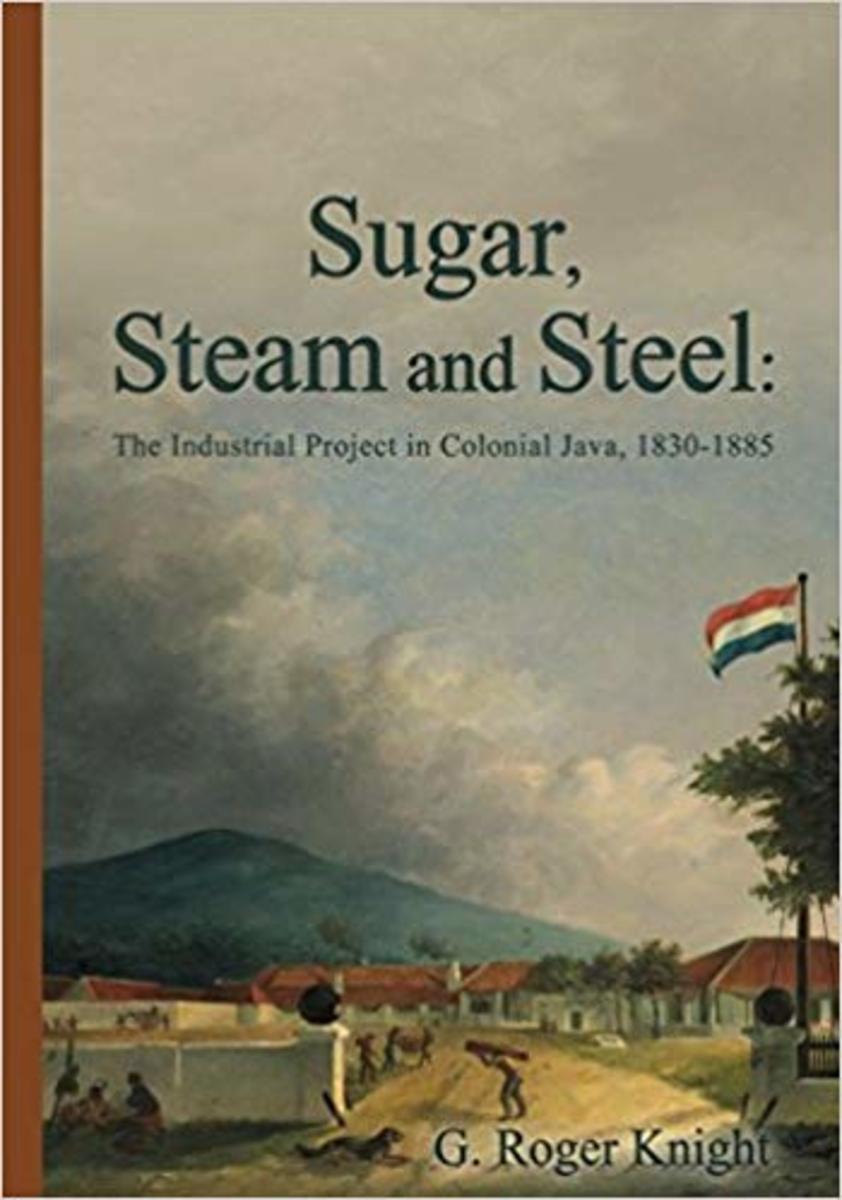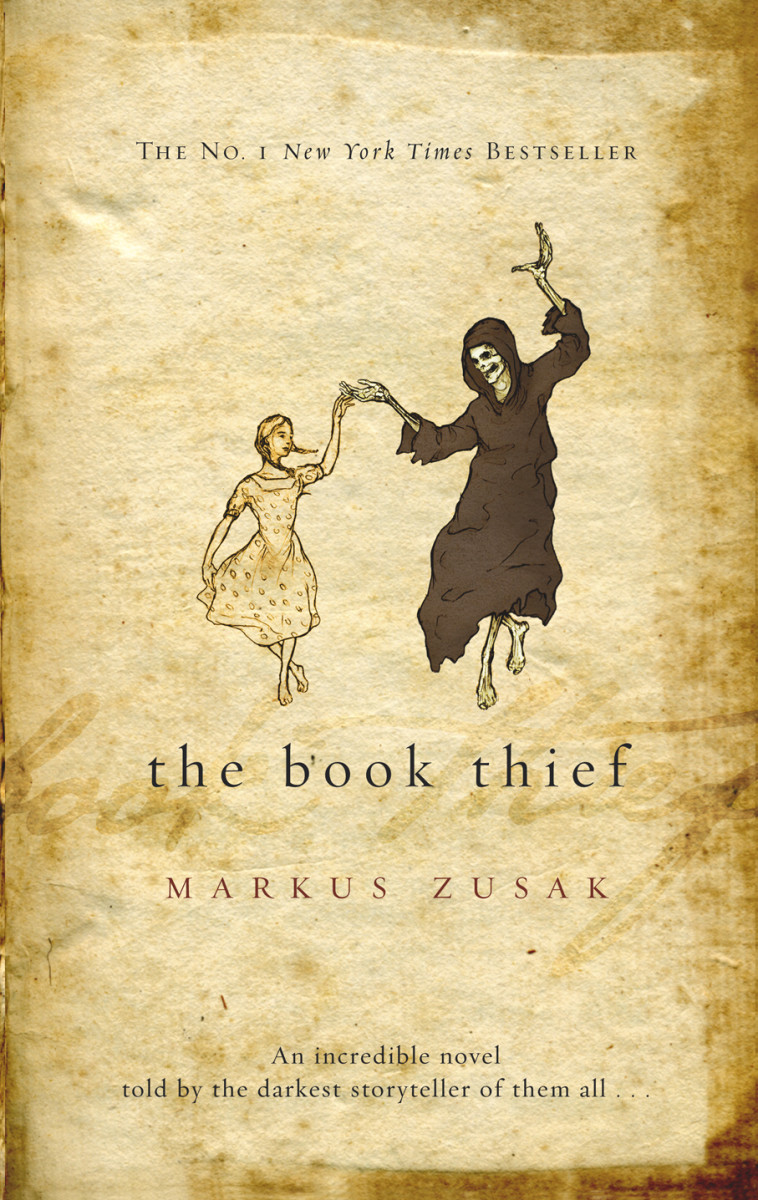My Top Ten Favorite Novels of 2017

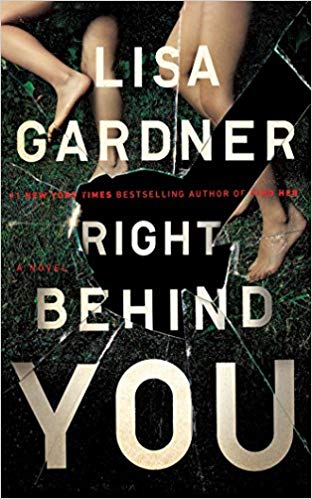
Right Behind You by Lisa Gardner
Eight years ago, to save both of their lives, Sharlah May Nash's older brother, Telly beat their drunken father to death with a baseball bat. Now thirteen years old, Sharlah is about to be adopted by retired FBI profiler Pierce Quincy and his partner, Rainie Conner. A double murder at a local gas station disrupts their plans as Quincy and Rainie are quick to offer assistance. The mounting evidence indicates the shooter may very well be Sharlah's older brother, and it appears his killing spree has only just begun. Why after eight years has this young man started killing again? And what does this mean for Sharlah May? Is her brother a hero or a killer? And how much will it cost her new family before they learn the truth? Because as Sharlah May knows all too well, the biggest danger is the one standing right behind you .
Right Behind You is a welcome return by Lisa Garner to her series featuring FBI profiler Pierce Quincy, now retired, and his wife, Rainie Connor, a former homicide detective. Gardner also writes several other series featuring Detective D.D. Warren and another with Officer Tessa Leoni. All are excellent, and she often has her characters crossover and interact. This novel like most of her others relies more on the human interaction than on which series character is at the center.
I still find it mystifying that even after a few decades of best sellers, Lisa Gardner remains mostly unknown to many of my friends and acquaintances to whom I continue to recommend her books, year after year.
So, here I go again: This is a very good suspense novel. Read it.
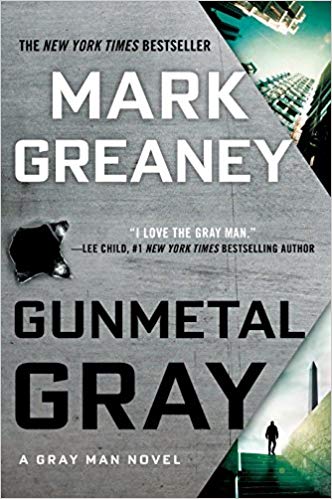
Gunmetal Gray by Mark Greaney
After five years on the run, and after several changes in command at the CIA, former agent Court Gentry is back in the agency mostly on his own terms. But his first mission makes him wish he had remained a private contractor when a pair of Chinese agents, totally against protocol, try to take him out in Hong Kong while he waits for mission intel. He has to improvise completing his mission as he tries to find out what went wrong. Court's hunt for answers leads to his old friend and employer, Donald Fitzroy, who is being held hostage by the Chinese. Fitzroy was contracted to find Fan Jiang, a former member of a computer warfare unit responsible for testing China's own security systems. And it seems Fan may have been too good at his job--because China wants him dead. The first two kill teams Fitzroy sent to find Fan have disappeared and the Chinese have decided to "supervise" the next operation. What they don't know is that Gentry's mission is to find Fan first for the United States, and that a Russian team has also been sent to extract Fan.
This may not be my favorite Gray Man novel, but it is, perhaps, the most fascinating because we learn a little more about the inner workings of the main character, Court Gentry, and how became who he is. As with any good literary series which survives and thrives, Gentry must have a life journey and a character arc. He has been most effective as an operative when he is a lone wolf with no attachments.
In this book, Court, against his own intentions and better judgment, begins to have feelings for Zoya Zakharova when they are forced by circumstances to work together to save Fan. This is not a romance novel, and Greaney doesn't play it out as one. Both his characters know what a deadend even contemplating a relationship is for them. Their mutual respect and affection progresses like a cat and mouse gambit while they are busy applying their considerable skills to the ever changing shape of their mission.
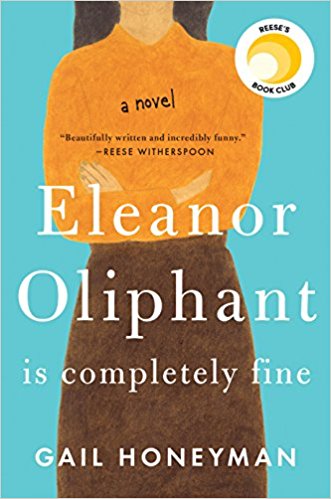
Eleanor Oliphant is Completely Fine by Gail Honeyman
Eleanor Oliphant struggles with social skills and tends to say exactly what she's thinking. She has a carefully planned life where weekends are structured around frozen pizzas, vodka, and phone chats with Mummy. She is hoping to engineer a meeting with a rock and roll singer who should be her soul mate. But everything changes when Eleanor meets Raymond, the IT guy from her office. When she and Raymond help get an elderly gentleman to hospital, they make an unshakable friend. Raymond will also not be shaken when Eleanor's life plans begin to unravel.
In this book, Gail Honeyman walked the razor's edge between ridiculous humor and genuine pathos with such seemingly effortless skill that I was worried she might slip off one side or the other, but I had to go along to see if she could make it work in the end. She was even more successful than that. Better than merely completing a skillful trick, she made the story whole in the end, better than the sum of its parts.

She Rides Shotgun by Jordan Harper
Polly McClusky is a solitary, 11-year-old, whose only real companion is a teddy bear she knows she is too old to carry with her everywhere. Her father is an ex-con who shows up fresh from prison with a story about her needing to leave with him to keep her safe from the Aryan Steel gang who have a vendetta on his life which probably includes his family. Soon enough, Nate and Polly discover that Polly's mother has already been murdered. Polly is forced to grow up with barely any time to mourn her mother. She learns from her father how to take a punch and how to apply a choke hold. Nate learns what it's like when love is unconditional, blood deep. But can that powerful bond outlive the Steel's forever vendetta on their lives. Nate just wants a truce so that he and Polly can live out an honest life. He knows the only way is to make himself more trouble than what his death is worth.
Harper wisely creates several vivid characters who, for their own very good reasons, either help or hinder Nate and Polly's escape. Polly doesn't much like it that her dad takes up with a woman from the Aryan Steel hierarchy, but she soon sees the predicament from Charlotte's perspective, unable to stay behind after she's helped them, and how Charlotte has come to see her father much like she does, a good man trying to do his best for more than just himself.
There is also Scubby, the meth tester, the connoisseur who can determine the quality of the product with one sniff, who is not a member of the Aryan Steel, but just a talented, valuable cog in their drug production and distribution machine. He is not emotionally or intellectually connected with any ideology beyond staying hopped up and alive, so he has no qualms about doing whatever little he can for Nate and Polly to repay them for letting him go. Det. John Park who proves that police are neither as dumb or negligent as often portrayed in crime novels nor as sharp and deductive as they sometimes appear in others. Instead, Park is an example of grit and determination being as important as the solving of puzzles.
As might be inevitable, there are a few instances where the action stretches the normal bounds of credibility, but then this isn't a normal sort of story. Riding shotgun with Polly was worth the stretches. Whenever Harper's next novel comes down the pike, I'll be hopping on.
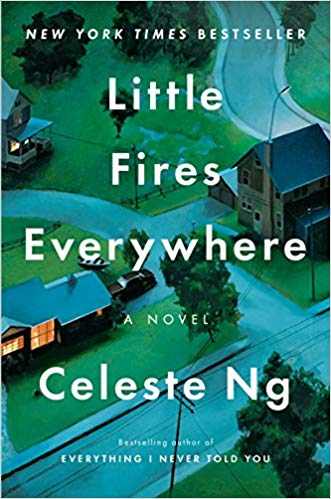
Little Fires Everywhere by Celeste Ng
The Richardsons, Bill, an attorney, his wife Elena, a journalist, and their four children, are living an outwardly idyllic existence in Shaker Heights, an upscale, trendy suburb of Cleveland until Mia Warren and her teen daughter Pearl moves into a rental home owned by the Richardsons. Mia is a reclusive photographer-artist of some note. Pearl is a studious introvert who tolerates her mother's nomadic life, moving from place to place in search of inspiration.
None of Richardson's give them much thought until second son, Moody Richardson develops a fast friendship with the usually quiet Pearl. Izzy Richardson, the family iconoclast, becomes fascinated with Mia because of her art and temperament. Lexie, the daughter most like her mother, takes on Pearl as a personal makeover challenge. Trip, the oldest son, doesn't seem to notice them until he is left alone with Pearl and discovers how big a crush she had on him. Mr. Richardson must represent a long-time family friend in the disputed adoption of an Asian baby who may or may not have been abandoned. The baby's birth mother is a close friend to Mia Warren. These are the kindling which will erupt into little fires everywhere, both literally and figuratively.
On a trip to an art museum, Pearl sees a lost photographic display which includes her mother with a baby girl. Elena puts her journalist's skills to work on filling in the gaps in Mia Warren's story of her life. Her discoveries will not be as earth-shaking as the characters' reactions to them.
Celeste Ng's writes with a flowing, disarming style which beckons the reader along, never pushing too hard, letting momentum have its sway. She casts just enough light ahead to see an unexpected curve or an obstacle to sidestep. I was aware at times that I might not be the intended audience for this book, but I am grateful to Ng's talents for making it impossible to put it down. I was emotionally involved and enriched as I am with all my experience with all worthy works of art
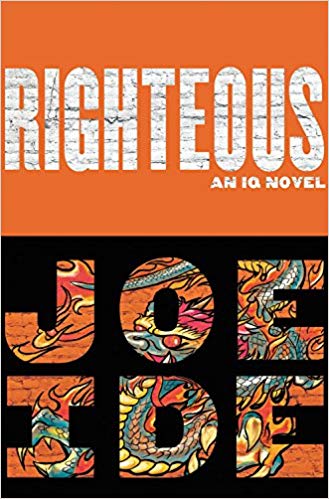
Righteous by Joe Ide
For ten years, Isaiah Quintabe known as IQ has been gathering clues pertaining to the murder of his brother Marcus, a hit and run on a street corner, right in front of Isaiah . His brother had just stepped off the curb when he was rundown by a Honda Accord. It will bug IQ the rest of his life that he didn't get the license plate or enough descriptive elements to find that car. Even with a flourishing career as a pseudo P.I. more likely to help a neighbor as he is to take a higher paying, strings-attached case, IQ always saves time for seeking his brother's killer. The woman of his dreams, older, and once his beloved brother's girl, asks IQ to find her sister Janelle and Janelle's boyfriend before they are both killed by a loan shark. Isaiah talks his former nemesis, Dodson, into being his sidekick even though Dodson believes he is the real Sherlock Holmes of the duo. Even IQ is confused and deceived by the twists and turns the case takes, but things come into focus when the end result appears to be connected to Marcus's murder.
Joe Ide has a confident grasp of who Isaiah is and what he can become even if IQ himself has begun to question that certainty as he matures. As he becomes more set in his patterns of life and work, IQ has time to notice what's missing beyond just his brother. He recognizes his need for companionship, his desire for love, his need to share his work with someone even if it's Dodson. I envision the already wonderful novels becoming more real and fulfilling.
Ide's previous book, entitled IQ was a winner of the Anthony, Macavity, and Shamus Awards.
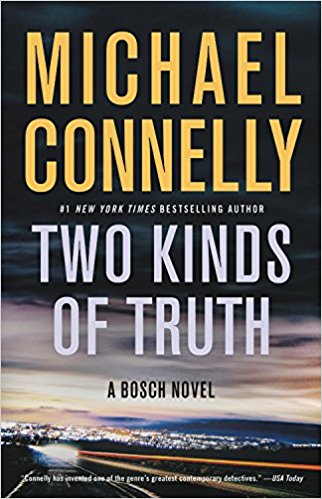
Two Kinds of Truth by Michael Connelly
Harry Bosch is back as a volunteer working cold cases for the San Fernando police and is called out to a local drug store where a young pharmacist has been murdered. Bosch and the town's three-person detective squad sift through the clues, which lead into the dangerous big-business world of prescription drug abuse. Meanwhile, Bosch is accused of planting evidence in one of old successful LAPD cases. With few friends left in the LAPD, Bosch must use cunning and help from his half-brother Mickey Haller to defend himself and clear his reputation. The two unrelated cases play out with Bosch at the center of each. Along the way he discovers there might be two kinds of truth: the kind that sets you free and the kind that leaves you buried in darkness.
As Harry Bosch slips from middle age into his elder years, Connelly has deftly managed to keep his character's dogged determination while both he and his character adjust to a less hectic, less pressured pace with no lessening of his earnest, moral ethic. Harry still may not be a "by-the-book" investigator, and his demeanor may still rankle partners, past and present, but he still cares about bringing those who cause others harm to some kind of justice.
I believe also that I like Mickey Haller best when he's helping and sometimes, sparring with his half-brother Harry.
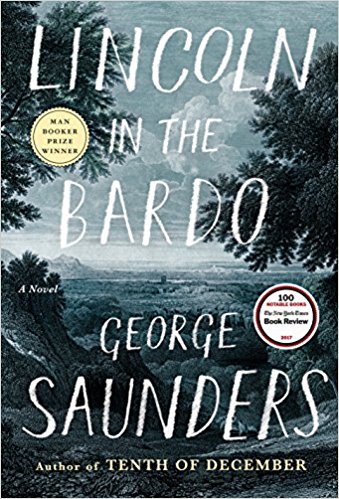
Lincoln in the Bardo by George Saunders
Early in 1862, the Civil War is less than one year old. The nation and a President mourn the loss of his son Willie to a sudden illness. The boy is laid to rest in a loaned crypt in a Georgetown cemetery. Newspapers report that a grief-stricken Lincoln returns, alone, to the crypt several times to hold his boy's body.
From that seed of historical truth, George Saunders constructs a novel of sorts wholly unique in structure and presentation. Though linear in progression, it is both retrospective and episodic with characters who do not always interact, but somehow all contribute to the resolution. Saunders relates the story of the Lincolns and the country itself through the recollections of those who have passed on, many of whom can't quite admit they are actually dead so they persist as confused souls between the here and after.
Saunders' scope encompasses far more than one father's grief over the death of a young son, casting a broader light on the travails of a variety of characters whose stories illuminate the struggles of a nation divided against itself.
Willie Lincoln wakes to find himself in a transitional state--called, in the Tibetan tradition, the bardo. The boy who will never age beyond 11 years understands little about what is happening to him and what is expected of him. His only solace comes when he tries to sit upon his father's knee as he often did in life, sinking nearly inside the heart-broken old man.
Though Lincoln and his son are the impetus for the novel, it is the long-term inhabitants of the bardo who are the protagonists. Their regular sojourns to the gates of the graveyard through which they cannot pass and the wandering souls they encounter provide Saunders with his opportunities to illuminate anecdotally the different facets of the burgeoning country's irreversible course to civil war. I am not at all certain that Lincoln in the Bardo is a great novel or even a novel at all. I am certain it is effective and brilliant and may be an invention unto itself, a prose transcription of a tragic-comedy in two acts, a sort of historical "Waiting for Godot" with annotated footnotes.
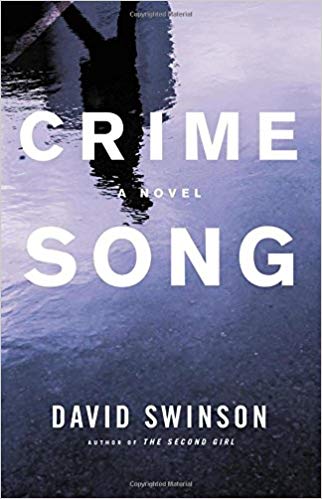
Crime Song by David Swinson
Frank Marr was a good cop with a bad habit, until his burgeoning addictions to alcohol and cocaine forced him into retirement from the DC police. Now, as a private investigator, making just enough to barely feed himself and his habit, he agrees to take on a case as a favor to his aunt, who was like a second mother to him growing up. A short surveillance confirms that his cousin Jeffrey is involved with a small-time drug selling operation. While Frank mulls over how to tell his favorite aunt, his home is burglarized and his cousin is dead on his kitchen floor. Worse, Frank's .38 revolver stolen in the robbery turns out to be the murder weapon.
Along with clearing his name as a suspect, Frank would really like to recover his cherished music collection, dozens of vinyl albums that belonged to his late mother. If he can find the stolen merchandise, he hopes to find out who killed his cousin. Using some of the best investigation work he has done in years and with whatever credibility he has left with his former colleagues on the force, Frank maneuvers his way through a web of petty thieves, desperate addicts, deceiving fences, good cops, bad cops, and one morally compromised taxi driver. Stretching himself and his stash thin, Frank is determined to uncover the truth as he wrestles with his addiction, and both pursuits could prove deadly. This time, it may just be a question of what gets him first.
Last year, Swinson's Second Girl made my Top Ten Favorites. I went along for the first feverish addicted ride because Frank Marr was such a unique and credibly flawed protagonist, but when I started Crime Song, I began to feel the weight of that monkey, not just on Frank's back, but on the reader's as well. Swinson was aware of the problem. Before I gave up, I began to see subtle shifts in Frank's behavior. Although Frank may never be a cold turkey guy who changes into a pillar of moral rectitude, he has always known that he was once a better man than the one he has become. He knows his female lawyer friend can never be anything more than that if he doesn't make some serious changes.
Swinson, a former D.C. cop himself, knows his subject matter, has an authentic grasp of character, and can tell a story well. Frank Marr is in capable hands
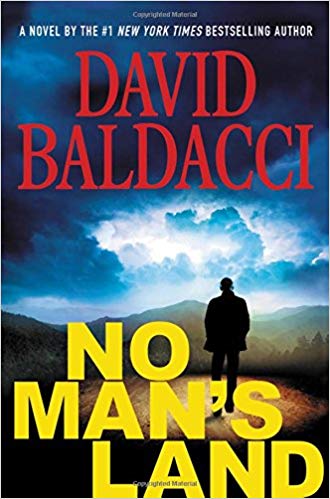
No Man's Land by David Baldacci
John Puller's mother vanished thirty years ago from Fort Monroe, Virginia. Ever since, Puller had assumed the story his father, a respected general in declining health, was the truth. But new evidence comes out of unlikely places, and Puller's own investigation of that evidence suggests his father's version may not have been entirely accurate. In fact, his father may be at the heart of his wife's disappearance.
Aided by his brother Robert Puller, an Air Force major, and Veronica Knox, who works for a secret U.S. intelligence organization, John tries to uncover the truth whether it exonerates his father or convicts him. A shadowy figure named Paul Rogers is mixed up in the incident somehow. A violent offender who spent ten years in prison, he may have been at Fort Monroe at the same time as Puller's mother.
Baldacci lets the reader inside Rogers' head to understand the physical and mental torment the man has been through since being a guinea pig for clandestine eugenics-type efforts to create a better soldier through training, testing, and cell mutation drug therapy. The headaches and other symptoms confirm in Rogers' mind that he doesn't have long to complete his revenge.
Obviously, there are shades of Mary Shelley's Frankenstein and the Marvel Comics character Wolverine with all the bitterness, anger and pain of the creature who did not ask to be created. Baldacci does it well without too much sympathy for Rogers whose violent tendencies caused him to commit some heinous crimes.
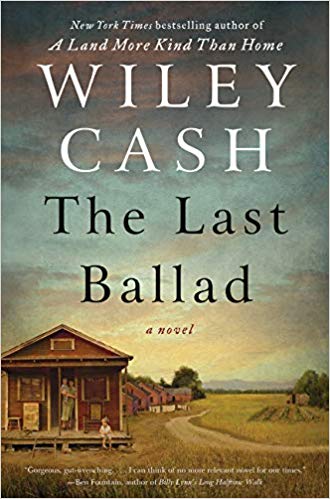
The Last Ballad by Wiley Cash
In the Appalachian foothills of North Carolina in 1929, Ella May Wiggins, nearly 30 years-old, navigates several miles both ways to her night shift job at American Mill No. 2 in Bessemer City. She earns a paltry nine dollars for seventy-two hours of work each week, to support four kids on her own since her husband ran off. When the union leaflets begin circulating, Ella May tries to ignore them like she knows she should, but when one of her children gets sick. She may lose her job if she doesn't fight for it.
On the night of the county's biggest rally, Ella May, weighing the costs of her choice, makes up her mind to join the movement. She speaks and sings a ballad at the rally and her words inspire the crowd. Some leaders of the movement ask her to write more songs and speak at other rallies. At first, they agree to pay her more than she would make at her job, and she can take care of her sick children.
Before long, Ella May sees racism and corruption, both inside and outside the movement. She sees how innocent people are caught in between the overzealous on both sides.
Wiley Cash captures a moment in time in a long struggle for worker's rights and civil rights. He doesn't bother to sugarcoat any of it because that would serve no purpose. His main character Ella May Wiggins is based on an actual union activist best known for her ballad, "Mill Mother's Lament," but her story is told by Cash as fictional narrative with supporting characters both historical and fictional stand-ins or composites. The desired intent which is successfully accomplished by Cash was to portray that moment in time as faithfully as possible.
Cash also captures the simple truth which Wiggins believed in the last few years of her life: that the union was the only organized force she had encountered that promised her a better life. Nearly 200 years of proselytizers have failed to express it better.
Special 11th Novel:
Universal Harvester by John Darnielle
I liked Darnielle's previous novel, Wolf in White Van, although it was very different and thus, difficult to recommend. Maybe I liked it because it was so different, but would others who rely on the consistency of my recommendations?
Again, Universal Harvester, presented a similar quandary. Ultimately, Darnielle misses the mark with this one, but I am including it as an extra entry to my list because there is a quality of inventiveness and eerie texture to his work, even when he misses, that transfers into my psyche and registers there indelibly.
In the late 90s, Jeremy works at the Video Hut in Nevada, Iowa, a small town in the center of the state pronounced Nevay-da. It gets him out of the house, where he and his dad just sit around missing his mom, who died six years ago in a car wreck. But when a local schoolteacher comes in to return her copy of Targets, a mid-sixties movie starring Boris Karloff, she has an odd complaint: "There's something on it," she says. Two days later, a different customer returns a different tape, a new release, and it's not defective, exactly, but altered: "There's another movie on this tape."
Jeremy takes a look, and finds, in the middle of each movie, the screen blinks dark for a second and a few minutes of another movie has been taped over the original. It's a poorly-lit, jittery home video. The scenes are odd and sometimes disturbing. There are no identifiable faces, no dialogue or narration, but Jeremy is certain he recognizes landmarks from just outside of town.
With a set-up like that, you would think it couldn't miss, but, in a classic sense, it does. It may just be a different story than what a reader like myself wanted it to be. I'm more than okay with that, but I still want that other story.
In the words of the best two line review I've ever read:
"There is a version of this story where it actually gets told. But this isn't that version."
Honorable Mentions:
Blood Truth by Matt Coyle
Robicheaux by James Lee Burke
Tool of War by Paolo Bacigalupi

